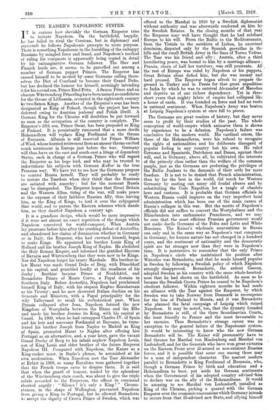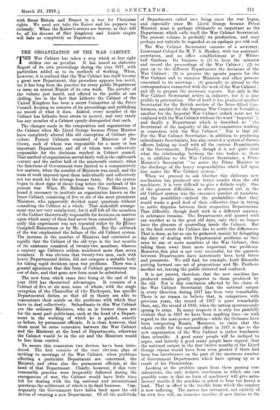111E KAISER'S NAPOLEONIC SYSTEM.
IT is curious how slavishly the German Emperor tries to imitate Napoleon. On the battlefield, happily, he has failed to rival the Corsican, but in diplomacy and statecraft he follows Napoleonic precepts to more purpose. There is something Napoleonic in the humbling of the unhappy Russians by mingled force and fraud, and Napoleon's method of ruling his conquests is apparently being copied in detail by his unimaginative German follower. The Slav and Finnish lands are, it seems, to be parcelled out among a number of German puppet Princes. The Emperor has caused himself to be invited by some Germans calling them- selves the Diet of Courland to become their Grand Duke, but has declined the honour for himself, seemingly intending it for his second son, Prince Eitel Fritz. A Saxon Prince and an `obscure Wurttemberg Princeling have been named as candidates for the throne of Lithuania, occupied in the eighteenth century by two Saxon Kings. Another of the Emperor's sons has been designated as King of Poland, though the project has been deferred owing to Austrian jealousy and Polish illwill. A German King for the Ukraine will doubtless be put forward as soon as the occupation of the country is complete. The Emperor's fifth son, Prince Oscar, has been proposed as King of Finland. It is persistently rumoured that a more docile Hohenzollern will replace King Ferdinand on the throne of Rumania. Albania is still reserved for Prince William of Wied, whose hurried retirement from an-uneasy throne excited much merriment in Europe just before the war. Germany will thus have on the east and south-east a fringe of dependent States, each in charge of a German Prince who will regard the Emperor as his liege lord, and who may be trusted to indoctrinate his subjects with German Kultur in the trim Prussian way. We have yet to see how the Germans propose to control Russia herself. They will probably be ready to restore the Tsardom when they think that the Russians are satiated with anarchy ; but for the moment Russia may be disregarded. The Emperor hopes that Great Britain and the Western Allies, tiring of the war, will make peace at the expense of their faithless Russian Ally, thus leaving him, as the King of Kings, to lord it over the subjugated Slav world, and to pursue the Eastern schemes which dazzle him, as they dazzled Napoleon a century ago.
It is a grandiose design, which would be more impressive if it were not almost an exact repetition of the design which Napoleon conceived for world-conquest. -When Austria lay prostrate before him after the crushing defeat of Austerlitz, and abandoned her claims of domination whether in Germany or in Italy, the Emperor, who had crowned himself, began to make Kings. He appointed his brother Louis King of Holland and his brother Joseph King of Naples. He abolished the Holy Roman Empire, and informed the gratified Electors of Bavaria and Wurttemberg that they were now to be Kings. Nor did Napoleon forget his trusty Marshals. His brother-m- law Murat was made Grand Duke of Berg, with Dusseldorf as his capital, and grumbled loudly at the smallness of his duchy ; Berthier became Prince of Neufchatel, and Bernadotte Prince of Monte Corvo, a Papal domain in Southern Italy. Before Austerlitz, Napoleon had proclaimed himself King of Italy, with his stepson Eugene Beauharnais as his Viceroy ; and he now showered Italian duchies on his Generals and Ministers, with a Papal principality for the wily Talleyrand to recall his ecclesiastical past. When Prussia collapsed after Jena, Napoleon formed the new Kingdom of Westphalia between the Rhine and the Elbe and made his brother Jerome its King, with his capital at Cassel. In 1808, when he had entrapped Charles IV. of Spain and his heir and successor Ferdinand at Bayonne, he trans- ferred his brother Joseph from Naples to Madrid as King of Spain, promoted Murat to Naples after offering him Portugal as an alternative, and, a year later, gave the vacant Grand Duchy of Berg to his infant nephew Napoleon Louis, son of King Louis and elder brother of the future Emperor Napoleon III. Compared with Napoleon, the Kaiser as a King-maker must, in Burke's phrase, be astonished at his own moderation. When Napoleon met the Tsar Alexander at Erfurt in 1808, so many Royalties were gathered together that the French troops came to despise them. It is said that when the guard of honour, misled by the splendour of the Wurttemberg state coach, was about to give the triple salute accorded to the Emperors, the officer in command shouted angrily : " Silence it's only a King ! " Circum- stances, in the shape of Wellington, prevented Napoleon from giving a King to Portugal, but he allowed Bernadotte to accept the dignity of Crown Prince of Sweden, which was offered to the Marshal in 1810 by a Swedish diplomatist without authority and was afterwards conferred on him by the Swedish Estates. In the closing months of that year the Emperor may well have thought that he had subdued Europe to his will. From the Baltic to the Mediterranean, from the Vistula to the outskirts of Lisbon, he exercised dominion, disputed only by the Spanish guerrillas in the hills and the small British Army in the lines of Torres Vedras. The Tsar was his friend and ally ; Austria, after a third humiliating peace, was bound to him by a marriage alliance ; Prussia, shorn of half her territory, was still prostrate. All the rest of Europe was ruled by Napoleon or his puppets. Great Britain alone defied him, but she was uneasy and hard pressed. The Emperor began afresh to prepare the ground in Turkey and in Persia for that great expedition to India by which he was to outrival Alexander of Macedon and deprive us of our richest dependency. Yet in three short years that mighty fabric of empire had collapsed like a house of cards. It was founded on force and had no roots in national sentiment. When Napoleon's Army was beaten at Leipzig Napoleon's system at once fell to pieces.
The Germans are great readers of history, but they never seem to profit by their studies of the past. The whole conception of world-empire which animates them is shown by experience to be a delusion. Napoleon's failure was conclusive for the modern world. His cardinal errors, like those of the Hohenzollern, were his refusal to recognize the rights of nationalities and his deliberate disregard of popular feeling in any country but his own. He ruled Germans and Spaniards, Dutchmen and Danes, against their will, and in Germany, above all, he cultivated the interests of the princely class rather than the welfare of the common people, just as the Germans are preferring the privileges of the Baltic Junkers to the demands of their serfs for more freedom. It is not to be denied that French administration, then by far the best in the world, did much for Western Germany by rooting out many old feudal abuses and by substituting the Code Napoleon for a tangle of obsolete laws and customs. It is probable that German officials in Western Russia could improve on the very imperfect local administration which has been one of the main causes of Russia's collapse in this war. But the merits of Napoleon's officials did not suffice to convert the Westphalian and the Rhinelanders into enthusiastic Frenchmen, and we may be sure that the most efficient Prussian government would not make docile Germans of the Poles and Letts and White Russians. The Kaiser's wholesale annexations in Russia can only end in the same way as Napoleon's vast conquests in Germany, for human nature has not changed in a hundred years, and the sentiment of nationality and the democratic spirit are far stronger now than they were in Napoleon's time. It is instructive to remember that the only Prince in Napoleon's circle who maintained his position after Waterloo was Bernadotte, and that he made himself popular in Sweden by following a Swedish policy of which Napoleon strongly disapproved. Bernadotte, the ardent Gascon, adopted Sweden as his country with the same whole-hearted- ness that he had shown on the battlefield. As soon as he became the Swedish Crown Prince he ceased to be Napoleon's obedient follower. Within eighteen months he had made an affiance with the Tsar against the Emperor, by which Sweden was to take Norway from Denmark in recompense for the loss of Finland to Russia, and it was Bernadotte who planned the fatal campaign of Leipzig which ruined Napoleon. It may be noted, too, that the dynasty founded by Bernadotte is still, of the three Scandinavian Courts, the least friendly to France and the most favourable to her enemies. Thus Bernadotte's strange career was no exception to the general failure of the Napoleonic system. It would be interesting to know who the new German Bernadotte will be. The Kaiser will presumably have to find thrones for Marshal von Hindenburg and Marshal von Ludendorff, and for the Generals who have won great victories on the Eastern Front over ill-armed or non-existent Russian forces, and it is possible that some one among these may be a man of independent character. The nearest modern parallel to Bernadotte is King Ferdinand of Rumania, who, though a German Prince by birth and education and a Hohenzollern to boot, put aside his German sentiments when the Government of his adopted country advised-him to declare war on the ally of the Hohenzollern. It would be amusing to see Marshal von Ludendorff, installed as King of the Ukraine, picking a quarrel with the German Emperor over the economic concessions which Germanyintends to secure from that ill-advised new State, and allying himself with Great Britain and Prance in a war for Ukrainian rights. We need not take the Kaiser and his puppets too seriously. When the Kaiser's. armies are beaten, as they will be, all his dreams of Slav kingdoms and Asiatic empire will fade as completely as Napoleon's.



































 Previous page
Previous page